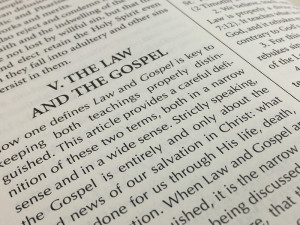by Rev. Jesse Burns

In chapter 4 of Galatians, St. Paul uses Sarah and Hagar to illustrate that salvation comes not by works of the law, but according to the promise of God. In the final verse, Paul declares that Christians are children of the free woman (4:31). We are heirs of eternal life by grace through faith and not according to our own works. Yet, as the Galatians were being led away from this message of justification to a false hope in their own righteous works (specifically, circumcision), so also do we hear false teachers today who seek to lead us away from the freedom of the Gospel into a trust of our own works. Because of this, Paul urges the Galatians–and also us–to “stand firm…and not submit again to a yoke of slavery.” (5:1)
Read Galatians 5:1-6
- Luther writes of verse 1: “This is the freedom with which Christ has set us free, not from some human slavery or tyrannical authority but from the eternal wrath of God. Where? In the conscience. This is where our freedom comes to a halt; it goes no further. For Christ has set us free, not for a political freedom or a freedom of the flesh but for a theological or spiritual freedom, that is, to make our conscience free and joyful, unafraid of the wrath to come (Matt. 3:7).”[1] How does Luther help us to understand what true Christian freedom is and is not? Does our freedom in the Gospel give us a license to sin (see also verse 13)? How might this understanding of Christian freedom comfort a Christian, especially when facing situations where they are not “politically” free?

2. Consider verses 2-4. If we trust in works of the law, such as circumcision, rather than in Christ alone, we make Christ “of no advantage” to us. By trusting in works of the law, we aren’t receiving and trusting in Christ’s perfect and all-availing work for us but in our own imperfect works. We would thus be severed from His grace. Luther writes: “Therefore anyone who keeps the Law with the idea that he wants to be justified through it is obligated to keep the whole Law; that is, he has not kept even one letter of the Law. The Law was not even given with the purpose that it should justify, but that it should disclose sin, frighten, accuse, and condemn.”[2] Why is it foolish to trust in our keeping of the law? Why does St. Paul say that those who would be justified by the law are severed from Christ? How is trusting in our keeping of the law a fundamental misunderstanding of the primary purpose of the law?
- In verse 5, St. Paul ties together “faith” and “hope.” Faith and hope are distinct from one another and yet are so closely related that it can be hard to tell them apart. Luther says, “hope is nothing but theological fortitude, while faith is theological wisdom or prudence.”[3] By faith we are already now justified and yet the faithful still wait for the full and visible experience of that reality in the life of the world to come. As we wait we undergo various trials and afflictions. This is where hope comes in. Hope endures. It perseveres. Luther writes, “Therefore this passage teaches clearly that the Law and works do not bring righteousness and comfort, but that this is achieved by the Spirit through faith in Christ; amid anxieties and tribulations He arouses hope, which endures and conquers evil.”[4] How might Galatians 5:5 give you comfort in the face of affliction? How do faith and hope relate to the freedom Paul spoke of in verse 1?
- Christians are set free from the wrath of God over sin by grace alone, through faith alone. But faith is never alone. Faith alone justifies but “after it has justified, will not go to sleep but is active through love.”[5] Love follows faith. “Thus a man is a Christian in a total sense: inwardly through faith in the sight of God, who does not need our works; outwardly in the sight of men, who do not derive any benefit from faith but do derive benefit from works or from our love.”[6] How does faith, by which we are justified before God, free us to live in “love toward one another?”[7] How does this help us to understand the proper role of good works in the life of a Christian? Once again, how does this relate to the freedom we have in Christ?
By the righteousness of Christ alone you have been freed from the curse of the Law, from sin, death, and hell. This freedom has been bestowed upon you by grace alone. The righteousness of Christ has become yours, and so you are set free from your own unrighteousness. Your conscience can be at peace as you live by faith before God. Then, because of this faith, you are free to live in love toward your neighbor.
The Rev. Jesse A. Burns is pastor of Redeemer Lutheran Church, Ventura, Iowa.
[1] Luther, M. (1999). Vol. 27: Luther’s works, vol. 27: Lectures on Galatians, 1535, Chapters 5-6; 1519, Chapters 1-6 (J. J. Pelikan, H. C. Oswald & H. T. Lehmann, Ed.). Saint Louis: Concordia Publishing House. page 4
[2] Ibid. pg 14
[3] Ibid. pg 25
[4] Ibid. pg 27
[5] Ibid. pg 30
[6] Ibid. pg 30
[7] The Lutheran Service Book (St. Louis, MO: Concordia Publishing House, 2006). page 201